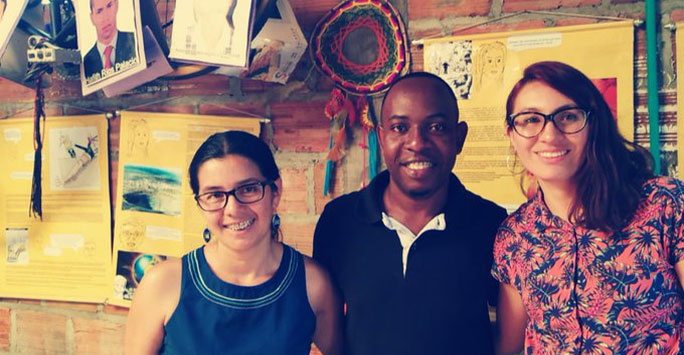#ArchiCom – Community Archives of Human Rights
During decades of conflict, community actors did their best to document the identities and testimonies of victims, including those often overlooked (e.g. women and children); these irreplaceable archives are invaluable for clarifying truths and obtaining recognition and justice for victims. However, physical, and political conditions mean many are at risk. MVR supports communities to preserve and disseminate these archives, through its project #ArchiCom.
Archives of human rights and historical memory have been formally recognized in Colombia as mechanisms for transitional justice, i.e. to ensure guarantees for victims of truth, justice, full reparation and no-repetition, as set down in article 3 of Law 1448. To this end, #ArchiCom works to make more accessible a range of community-curated human rights archives, with significant impacts on individuals, groups and institutions. For example, by bringing to light undisclosed victim testimonies, it encourages individual claims for justice and reparations; at the collective level, it lends visibility to the demands of specific social groups (e.g. women, indigenous communities) whose marginalisation is a function of conflict; importantly, it highlights the particularised character of violence (e.g. sexual violence) towards specific groups.
At the same time, #ArchiCom brings recognition to the community networks behind such archives, celebrates their agency and aims to strengthen their capacity, by assessing their current needs and transferring the necessary tools, skills, and resources. #ArchiCom leaves behind a permanent legacy: pilot-tested toolkits, and a pedagogical model for supporting the work of community human rights archives. In Colombia, the sharing and societal use of human rights archives is national policy and considered an integral part of transitional justice and symbolic reparations. The #ArchiCom team therefore works not only to support communities to preserve their archives, but also to disseminate and interpret their meaning to wider society. #ArchiCom is trialling a model of participatory policy responses to real-world concerns of transitional justice in post-conflict situations; it strived to close the gap between research and impact; national and international goals; theoretical models, and policy initiatives; institutional processes, and community-led participation.
#ArchiCom, like MVR, is focused on traditionally overlooked victims of the conflict. It collaborates with four partner organizations, each of which specifically targets women and girls, to highlight the gendered character of violence and work for gender-related impact. These counterparts are: the Red de Mujeres Víctimas (Network of Women Victims), who focus on recognition of women’s testimony and the use of sexual violence; the Organización Feminina Popular (Popular Organisation of Women), who work to a broad remit of women’s human, economic, and gendered rights; Fundación Guagua (Guagua Foundation), and Corporacion Zoscua, both of which document human rights violations against children, young people, and adults, with particular attention to gender. These women-led organizations take ownership of their relationships with #ArchiCom and develop their archives according to their own needs. #ArchiCom is therefore helping prepare female leaders to build capacity for archiving in their community organisations and, in turn; pass on their skills to other groups.

#ArchiCom Local Impact Consultant Cecilia Andrea Acosta Sánchez (right) with XXX and XXX of Fundacion Guagua in Cali - ordinary volunteers who compile, preserve, and disseminate archives of human rights from years of armed conflict (February 2020).
.jpg)